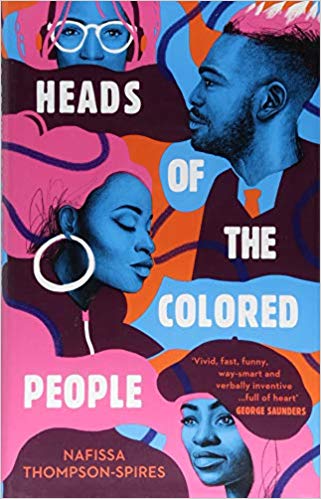How to end such a story, especially one that is this angry, like a big black fist? The voice is off-putting. All the important action happens offscreen; we don’t even see the shooting or the actual bodies or the video. Like that one guy in fiction workshop said, meta is so eighties. The mise en abyme is cool but overdone. This is a story of fragments, sketches. Dear author: thank you for sharing this, but we regret.

And what a brilliant story it is, this first, titular entry in the table of contents of this flawlessly executed, arresting debut collection. Of course, the very features listed by Thompson-Spires as flaws – her irony deliberately self-conscious – are its key attractions. That ‘Heads of the Colored People’ is a story of sketches, fragments leaves us as readers all the more intensely involved with it, reaching for truth even as we look away, sickened by the horror of truth’s implications.
Not all the stories in this collection are so deliberately oblique. Each and every one makes for compelling reading. My favourites are the linked stories – ‘Belles Lettres’, ‘The Body’s Defenses Against Itself’, the superb ‘Fatima, the Biloquist’. The brilliant little duology that is ‘This Todd’ and ‘A Conversation About Bread’. But then there’s the shocking needle-sharpness of ‘Suicide, Watch’ and ‘Wash Clean the Bones’ – I admire them all.
This is the kind of collection you might feel driven to read in a single sitting, just to see where it’s going, just to make sure that at least some of its characters emerge from their narratives unscathed. And to enjoy the writing, of course, the author’s seamlessly dexterous control of voice and form. Thompson-Spires has talked about her reasons for training her gaze on the American black middle classes in particular – because the issues they face are often hidden and not openly discussed – and this is a book that will make you question tired assumptions just as often as it makes you laugh.
I think it’s brilliant. I am so eager to see what Thomspon-Spires writes next, because the second book is, more even than the debut, the proof of an author’s intent and future direction.
I am not sure whether I personally would have considered Heads of the Colored People as a typical Gordon Burn Prize contender, if there is such a thing and maybe there isn’t and maybe that’s the point, but for me these stories have a smoothed perfection about them – an MFA quality – that removes them from the jagged edge of immediacy I have come to associate with the prize. Maybe I’m talking tosh and it wouldn’t be the first time. In either case, I hope Thompson-Spires garners many more award nominations, because the significance of her achievement is not in doubt.